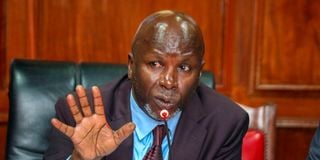Battle rages on between AG Justin Muturi and PSC over hiring of state counsel

Chairperson of the Public Service Commission Anthony Mwaniki Muchiri. FILE PHOTO | NMG
What you need to know:
- The fight over the hiring mandate was triggered by a recent letter by Mr Muturi in an advice to Prime Cabinet Secretary Musalia Mudavadi that PSC has no powers in regulating human resources in parastatals.
- The AG had cited Section 5(3) of the State Corporations Act, which he says provides for the power of a state corporation to employ the chief executive officer and other employees as well as to determine their terms and conditions of service.
The Public Service Commission (PSC) has told MPs to reject a proposed law amendment to give the attorney-general powers to hire and promote state counsels.
The changes to the Office of the Attorney-General Act, 2012 seek to give the AG powers to appoint deputy solicitor-general and State counsel.
The Statute Law (Miscellaneous Amendment) Bill No 68 of 2023 has proposed amendment of sections 13, 21 and 22 of the Act to hand the AG powers to hire and fire officers in his office.
PSC through its Chairperson Anthony Muchiri told members of the National Assembly Justice and Legal Affairs Committee (JLAC) that the proposed amendments are unconstitutional.
He also accused Mr Muturi of acting in bad faith, claiming that he had contravened the existing law by hiring staff in his office.
PSC had in a letter dated September 21, 2023 warned Mr Muturi that any hiring without the involvement of PSC would not be included in public service payroll.
“It has come to the attention of the commission that the Attorney-General intends to proceed with the recruitment and promotion of State Counsel in the Office of the Attorney-General and Department of Justice, which the commission had earlier disallowed,” Dr Rotich states in the letter addressed to Mr Muturi.
The letter added, “The commission wishes to point out that there is no constitutional or statutory provision that gives the Attorney-General authority to recruit and promote public officers in the office of the Attorney-General and Department of Justice.”
In its memorandum, the commission told JLAC that the amendment had been proposed in bad faith, citing previous fights with Mr Muturi over the role.
The commission further said that the AG is not listed as one of the independent constitutional offices in Chapter 15 of the Constitution and, therefore cannot demand to have powers to recruit staff in his office.
The commission said handing Mr Muturi such powers would create room for abuse of power.
“The proposals to amend the Act have been made in bad faith as evidenced by the fact that the Attorney-General has failed to comply with the law as is currently subsisting,” said Mr Muchiri.
“If the amendments have been proposed in good faith, the law as it should be applied as the proposed amendments are being pursued for future application. Laws are made for the public good and for posterity and should not be made for short term purposes,” he told the committee.
The commission said the proposed amendments would give the attorney-general sole and unfettered power to appoint, promote and determine terms and conditions of Service of Deputy Solicitors-General and State Counsel.
“The proposed amendments are an affront to the constitution which at Article 234(2)(a) gives the commission power to appoint persons to hold office in the Public service. The amendment might create a domino effect for other ministries to seek legislation to give them power to recruit staff for their offices,” said the commission.
The commission said that the office of the attorney-general has been in existence for as long as the executive arm of government, but successive solicitors-general, deputy solicitors-general, and State counsel have always been recruited, appointed and promoted by PSC.
PSC said no complaints have been raised on the alleged ‘inconsistencies in the operational framework of the office.’
“Additionally, contrary to what is stated in the memorandum of objects and reasons, Article 156 of the constitution does not establish the Office of the Attorney General as an independent office,” the memorandum adds.
He said the memorandum of objects and reasons in the bill is, therefore, misleading and should not be used a basis for amendment of the Act.
The fight over the hiring mandate was triggered by a recent letter by Mr Muturi in an advice to Prime Cabinet Secretary Musalia Mudavadi that PSC has no powers in regulating human resource in parastatals.
The AG had cited Section 5(3) of the State Corporations Act, which he says provides for the power of a state corporation to employ the chief executive officer and other employees as well as to determine their terms and conditions of service.
But in a letter dated August 7, PSC told the AG that he relied on a provision that was declared unconstitutional by the courts.
“The said provision of the law has twice been declared unconstitutional by the Employment and Labour Relations Court whose decisions on the same have not been set aside by the Court of Appeal,” PSC stated.
The Court had ruled that section 5(3) of the state corporations Act is in conflict with Article 234 (2) as read together with Article 260 of the Constitution on regulation of the public service.
It determined that the regulation of the human resources of state corporations falls squarely under the constitutional mandate of PSC.
According to the law, the Salaries and Remuneration Commission (SRC) has a constitutional mandate to advise on the remuneration and benefits of public officers.
“This advice of SRC is, however, supposed to be made to the Public Service Commission which has the responsibility of determining the terms and conditions of service of public officers in State Corporations as found by the courts,” PSC had noted.





